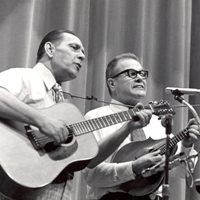
The Blue Sky Boys
Brothers Earl and Bill Bolick of the Blue Sky Boys were two of the most popular duet singers in country music in the 1930s. During this time, the brothers made nearly 100 recordings, and their music would influence such groups as the Everly Brothers and the Louvin Brothers. Ranking among the greatest brother duets in country music, the Blue Sky Boys left a vast repertoire of recordings and radio performances that continue to fuel country and folk musicians’ canon of songs and styles.
Bill (1917-2008) and Earl (1919-1998) Bolick were born and raised in Hickory, North Carolina, in the foothills of the Blue Ridge Mountains. They learned how to harmonize singing hymns at home with their family. A neighbor taught Bill how to play guitar, and he in turn helped Earl get started. Bill learned how to play mandolin, and the two started working up songs together with guitar, mandolin, and harmony singing.
The brothers started performing on a radio spot in Asheville in 1935, first with the Crazy Hickory Nuts, then as the JFG Coffee Boys with Homer Sherrill, the fiddler from the Hickory Nuts. Eventually the group went to Atlanta, and while there, the Bolicks auditioned for RCA Records as a duet. They named themselves the Blue Sky Boys, after their home in Western North Carolina, and made their first records in 1936. The recordings sold well, and their career quickly took off.
The brothers’ music career was disrupted in 1941, when they both enlisted in the military to fight in World War II. After they were discharged in 1946, they enjoyed a couple of successful years of playing music professionally, but country music was going electric, and the Blue Sky Boys were not interested. They retired in 1951, and did not record together again until the 1960s, when they released a couple of albums on Starday. The brothers did some performing in the 1960s, and they released an album on Rounder Records in the 1970s.


